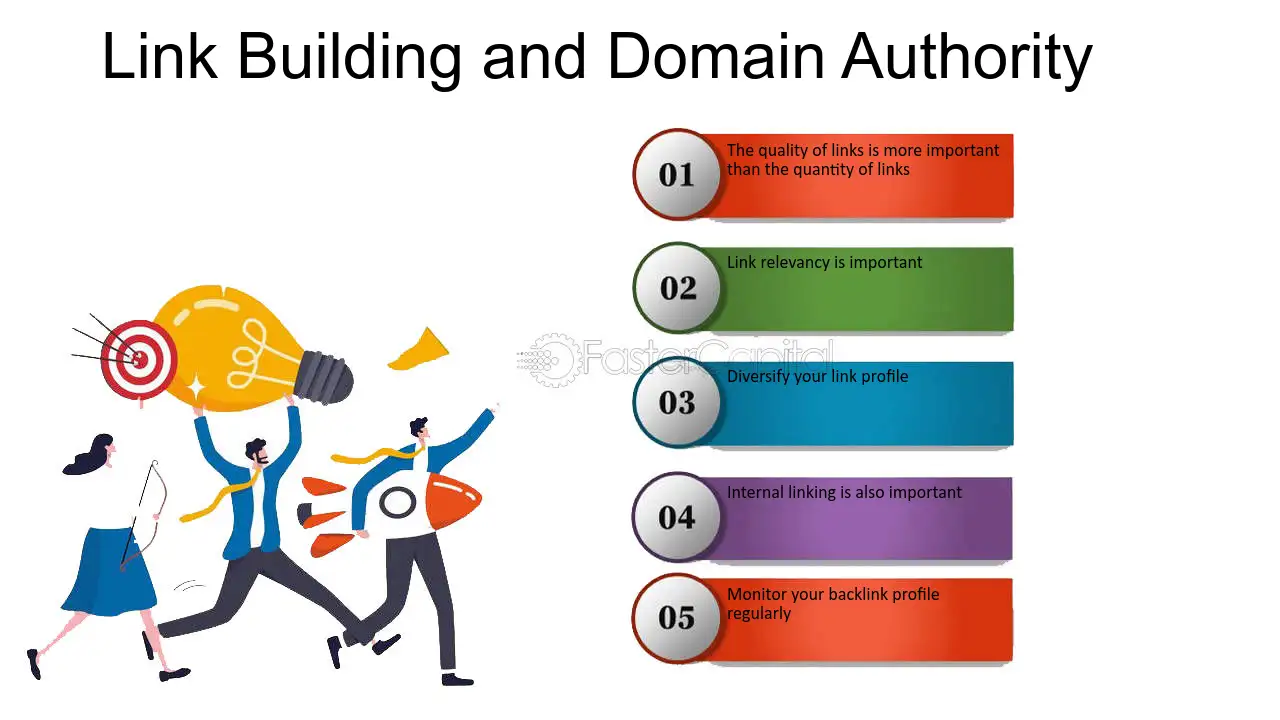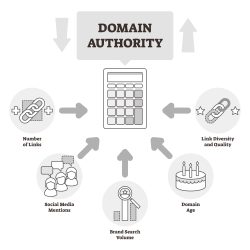Domain Authority and Its Role in Link Building, In the ever-evolving world of digital marketing, the concept of Domain Authority (DA) has emerged as a pivotal metric for measuring a website’s credibility and ranking potential in search engine results. Created by Moz, DA provides a score ranging from 1 to 100, reflecting the likelihood of a website ranking high on search engine results pages (SERPs). As businesses increasingly recognize the importance of search engine optimization (SEO), understanding domain authority and its role in link building has become essential for achieving long-term success online. This article delves into the intricacies of domain authority, explores its significance in effective link building, and offers actionable insights for enhancing your website’s performance.
What is Domain Authority?
Domain Authority is a search engine ranking score that predicts how well a website will perform in search engine results. It takes into account various factors, including the total number of inbound links, the quality of those links, and the overall trustworthiness of the domain. DA is measured on a logarithmic scale, meaning that increasing your score from 20 to 30 is relatively easier than boosting it from 60 to 70.
Key Factors Influencing Domain Authority
- Link Profile Quality: A diverse and high-quality link profile significantly impacts DA. Links from authoritative and relevant websites are more beneficial than numerous low-quality links.
- Domain Age: Older domains tend to have higher authority due to their established presence and historical trustworthiness.
- SEO Performance: On-page SEO elements, such as content quality, keyword optimization, and site speed, contribute to a site’s overall authority.
- Social Signals: While not a direct ranking factor, social media engagement can enhance visibility and drive traffic, indirectly influencing authority.
The Relationship Between Domain Authority and Link Building

Link building is a critical component of SEO, serving as a vote of confidence from one site to another. The higher the domain authority of the linking site, the more impactful the link will be for your site. Understanding this relationship is essential for developing an effective link-building strategy. The Power of Link Building cannot be underestimated, as it directly influences search rankings and overall site visibility.
Why Link Building Matters
Link building is vital for several reasons:
- Improved Search Rankings: Quality backlinks can help increase your site’s authority, leading to better rankings in search results.
- Referral Traffic: Links from relevant sites can drive targeted traffic to your site, enhancing user engagement.
- Brand Exposure: Effective link building can increase your brand’s visibility and credibility within your industry.
Best Practices for Link Building to Enhance Domain Authority
To improve your domain authority through link building, consider implementing the following strategies:
1. Create High-Quality Content
Quality content is the cornerstone of any successful link-building strategy. By creating informative, engaging, and valuable content, you increase the likelihood that other sites will link to your resources. Consider using formats such as:
- Blog Posts: In-depth articles that address common questions or provide insights into industry trends.
- Infographics: Visually appealing graphics that present data or information in an easily digestible format.
- Research Studies: Original research that offers new insights can attract attention from other websites looking to cite authoritative sources.
2. Utilize Guest Blogging
Guest blogging is a powerful way to build backlinks while also expanding your audience. By contributing to reputable blogs in your niche, you can earn valuable links and drive traffic back to your site. When guest blogging:
- Choose Relevant Blogs: Ensure the blogs you contribute to are relevant to your industry and have a strong DA.
- Craft Quality Content: Your guest posts should be informative and align with the host blog’s audience.
3. Build Relationships with Influencers
Connecting with influencers in your industry can open doors to high-quality backlinks. By establishing relationships, you can leverage their authority to enhance your own:
- Engage on Social Media: Interact with influencers on social platforms to build rapport.
- Collaborate on Projects: Partnering on webinars or joint content can create valuable linking opportunities.
4. Leverage Broken Link Building
Broken link building involves identifying broken links on authoritative sites and suggesting your content as a replacement. This technique not only provides value to the linking site but also earns you a quality backlink. To execute this strategy:
- Identify Relevant Sites: Use tools like Ahrefs or Moz to find websites in your niche with broken links.
- Create Content: Ensure you have relevant content ready to propose as a replacement.
- Reach Out: Contact the site owner with a polite email outlining the broken link and suggesting your content as an alternative.
5. Use Internal Linking Effectively
While external links are essential for building authority, internal links also play a crucial role. They help search engines understand your site’s structure and improve user navigation. To optimize internal linking:
- Link to Relevant Pages: Ensure your internal links lead to relevant content, enhancing user experience.
- Use Descriptive Anchor Text: The text used for the link should be relevant to the content being linked to.
Common Misconceptions About Domain Authority
Despite its significance, several misconceptions about domain authority and link building persist:
Misconception 1: Higher DA Always Equals Better Rankings
While a higher DA can improve the likelihood of ranking well, it is not the sole determinant. Other factors, such as content quality, user experience, and relevance, also play critical roles in search engine rankings.
Misconception 2: Quantity Over Quality
Some marketers believe that acquiring numerous backlinks is more effective than focusing on quality. However, high-quality links from reputable sources hold more weight than many low-quality links.
Misconception 3: DA is an Official Google Metric
DA is not a metric used by Google but rather a proprietary score developed by Moz. While it is a useful indicator of a site’s performance, it should not be viewed as an official ranking factor.
The Importance of Monitoring Domain Authority
To maximize the effectiveness of your link-building efforts, it is crucial to monitor your domain authority regularly. This practice allows you to:
- Evaluate SEO Strategies: Understanding how your DA changes over time can help assess the effectiveness of your SEO strategies.
- Identify Opportunities for Improvement: By analyzing your link profile, you can identify areas that require improvement, such as low-quality links that need to be disavowed.
Tools for Monitoring Domain Authority
Several tools can help you monitor your domain authority and link profile, including:
- Moz Link Explorer: Offers insights into your DA, backlinks, and overall link profile.
- Ahrefs: Provides a comprehensive view of your site’s backlinks, traffic, and rankings.
- SEMrush: Offers tools for tracking your DA and analyzing your competitors’ link profiles.
Conclusion: The Path to Strengthening Domain Authority Through Effective Link Building
Understanding domain authority and its role in link building is crucial for businesses seeking to enhance their online presence. By focusing on creating high-quality content, leveraging guest blogging, building relationships with influencers, and utilizing effective link-building strategies, businesses can improve their DA and, consequently, their search engine rankings.
As the digital landscape continues to evolve, staying informed about SEO best practices and continuously adapting your strategies will be vital to long-term success. Embrace the power of domain authority and link building, and watch your website’s credibility and visibility soar.
In conclusion, enhancing your domain authority is not just about increasing numbers; it’s about building a robust online presence that resonates with your audience and stands the test of time.









